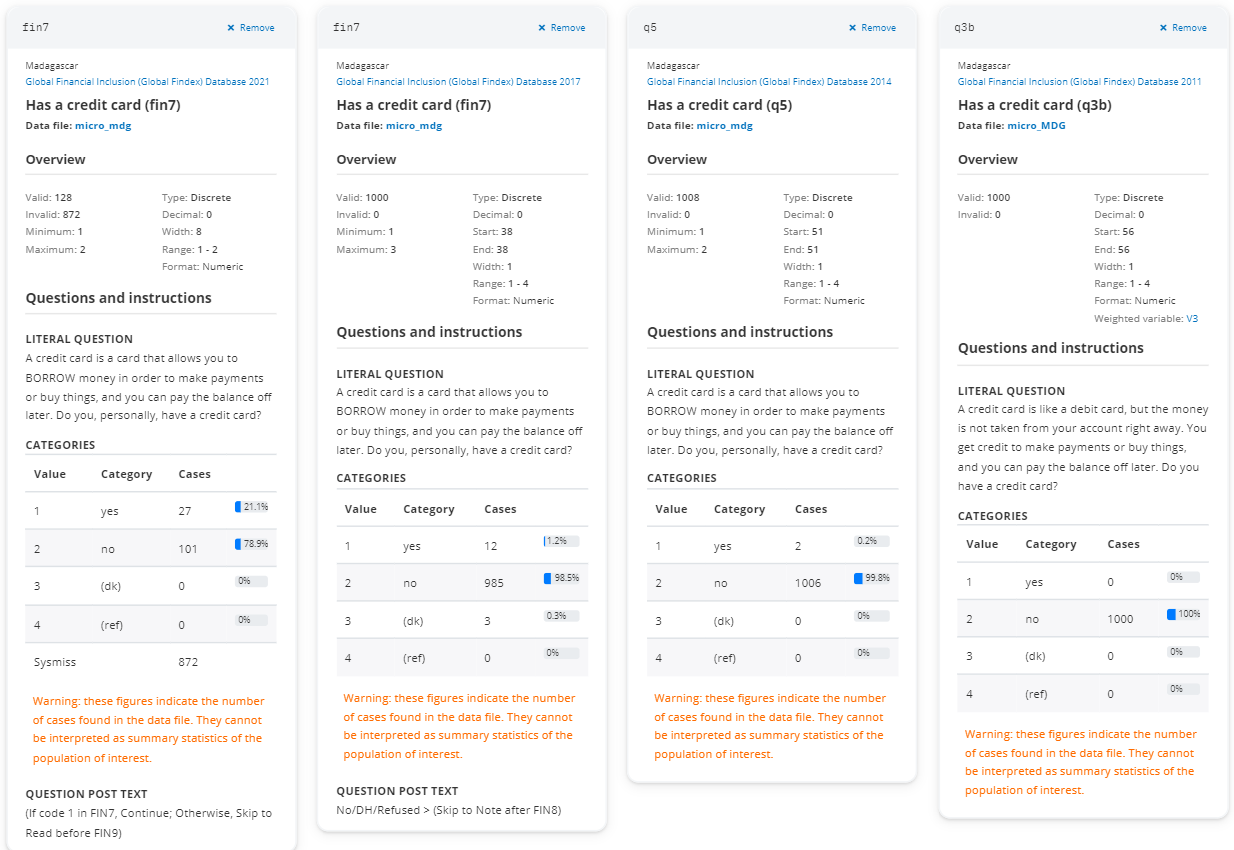Discovering high-quality research data can often feel like searching for a needle in a haystack. But what if it didn't have to be that way?
The World Bank Microdata Library is an online platform boasting thousands of meticulously curated microdata from around the world, available for everyone at no cost. As one of the world’s largest international collections of microdata, it facilitates easy access to anonymized microdata, synthetic microdata, documentation, and metadata that enables users to interpret, assess and reuse the data. The data are produced by the World Bank, international organizations, statistical agencies, and other agencies in World Bank client countries.
But first, what are microdata? In the World Bank Microdata Library, microdata are responses at the unit or respondent level from sample surveys, censuses, and administrative systems. The data in the Microdata Library present information about people in countries where the World Bank works, their institutions, environment, communities, and operation of their economies. Such data allow in-depth understanding of socio-economic issues by studying relationships and interactions among phenomena. Microdata are key to designing projects, formulating policies; targeting interventions; and monitoring and measuring the impact and results of projects, interventions, and policies.
The World Bank aims to offer unrestricted access to as much information as possible to all users. Each dataset comes with its own license and terms of use. Microdata, provided in common formats like Stata, SPSS, CSV, and ASCII, are accompanied by detailed metadata following the Data Documentation Initiative (DDI) standard, allowing users to effectively discover, assess, and download relevant data for research.
Who are the main users of the World Bank Microdata Library? It's a diverse array of profiles, including policymakers and NGOs for project design, journalists for research and reporting, citizens for accountability, educators for teaching, students for assignments and theses, and researchers seeking to augment or gain insights from existing data.
A step-by-step guide to the Microdata Library
From the Microdata Library’s home page, you can browse the catalog to discover new and existing data, run a keyword search in the main catalog or within different collections, or locate datasets used in publications through the Citations menu. Let’s unpack each one of them.
1. Browse the catalog
The Microdata Library updates its database regularly with both data and metadata. Newcomers interested in viewing available datasets can browse the catalog. This can be easily done from the home page by clicking "Browse Catalog" or selecting "Data Catalog" from the menu. Users are redirected to the Central Data Catalog, containing the complete inventory of datasets. Here, users can explore different datasets and delve deeper into ones that interest them. Furthermore, a list of recently added datasets is conveniently placed at the bottom of the Microdata Library's homepage for quick access.

Learn more about each dataset by simply clicking the hyperlinked survey title. This opens page providing the microdata download link; a detailed study description; data description; supporting documentation (e.g., questionnaires, reports, user guides, scripts to replicate analysis); related publications (citations); and links to other related datasets in the catalog. See an example here.
2. Run a keyword search
If you have a specific dataset in mind but are not sure where exactly to find it, you can use a keyword search from the home page. A keyword is basically a search term that describes the main concepts of your research topic. A user researching the utilization of financial services in Madagascar might use search terms like ‘save, borrow, credit, finance’, separating multiple keywords by AND or +.

A keyword search can also be employed to find specific variables within a study which may contain multiple datasets. In this example, searching the term ‘credit’ within multiple files yields 2 matches.
3. Search within collections
The World Bank Microdata Library categorizes certain datasets into Collections, which encompass specialized areas of research or originate from international development partners collaborating with the World Bank to enhance survey data quality worldwide. These collections include the Living Standards Measurement Study (LSMS), Global Financial Inclusion (Global Findex), Strategic Impact Evaluation Fund (SIEF), United Nations Refugee Agency (UNHCR), and UNICEF Multiple Indicator Cluster Surveys (MICS). Organizing datasets into these collections facilitates easy identification and access. In our example above, filtering datasets by the Global Findex collection streamlined the process, as it contained relevant variables of interest. This approach enhances efficiency by allowing users to target specific collections matching their research needs.
Refining our search and evaluating data
Our keyword search above produced 2,000+ matches, but we can refine the search by filtering on year (2011-2024), country (Madagascar), collections (Global Findex), and sorting results to aid our search.
Before combining datasets for analysis, we need to confirm the data are comparable. There is a variable comparison tool for that. See demonstration below:

Variable Comparison:

As the same question is asked over time, we conclude that the variable is consistent over time and suitable for our analysis.
4. Dataset citations
The Citations repository contains a compilation of over 2,500 publications that have utilized data from the Microdata Library. Each citation includes a hyperlinked title which, when clicked, provides access to publication details and links to the corresponding dataset(s). See an example here.

Our role: standards and guidelines
The World Bank is a strong advocate for the adoption of standards and facilitating the sharing of microdata worldwide. Through collaborations with other international organizations, it has created various tools and guidelines based on standards, helping countries and agencies to disseminate microdata effectively. One such tool is the NADA platform, an open-source cataloging tool developed by the World Bank, the platform on which the Microdata Library runs, and also utilized by over 80 countries and institutions.
Questions? Contact us at microdata@worldbank.org



Join the Conversation